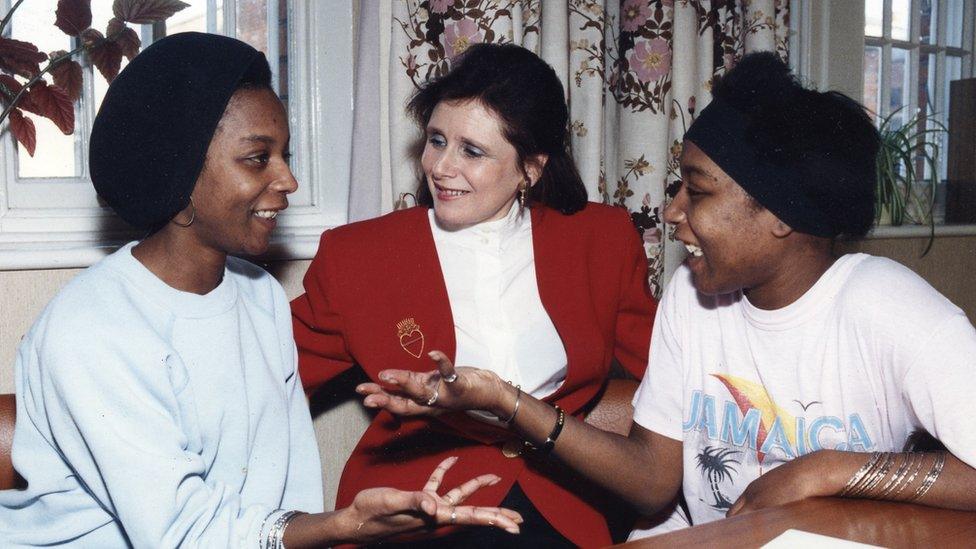Broadmoor: Silent twin on being locked up with Ronnie Kray
- Published
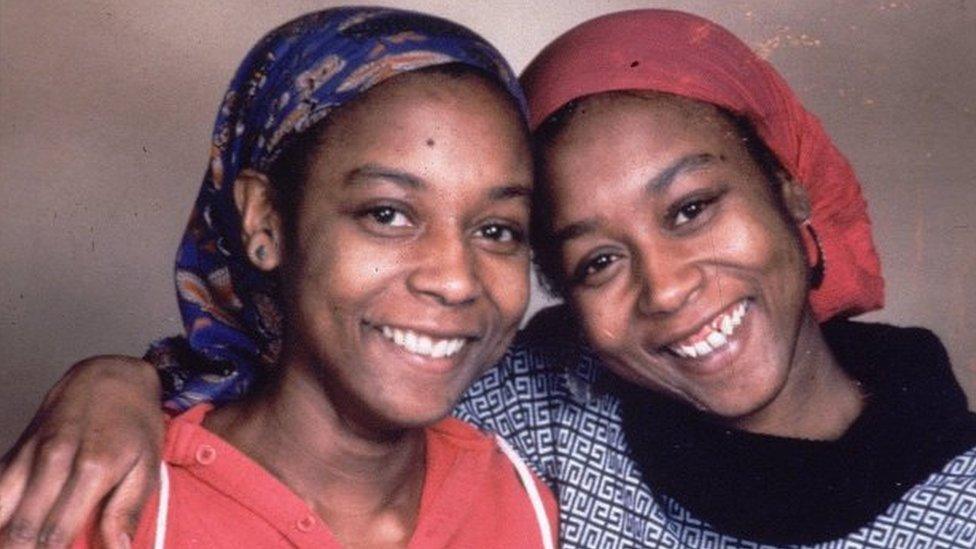
An educational psychologist says the twins could be "electively mute" and had "quite extraordinary synchronised movement" between them
They're the sisters that inspired a film, a hit song and were friends with a Kray twin, but for years they only ever spoke to each other.
At 19, they became the youngest female patients at Broadmoor - sharing the high security psychiatric hospital with notorious criminals like Charles Bronson and Yorkshire Ripper Peter Sutcliffe.
One psychologist said June and Jennifer Gibbons needed help and intervention.
Now surviving twin June tells her story in her own voice for the first time.
"We had a speech impediment. Our parents couldn't understand a word that we were saying, nobody understood - so we stopped talking," June told the new BBC podcast, June: Voice of a Silent Twin.
"Then we were ridiculed and bullied. It was a feeling of despair, desolation, being let down by everybody, hated and being made to feel horrible.
"It was almost like an unfolding horror story of mystery and intrigue, ending in tragedy. We were trying all these things to try to get help. We didn't know how it would end."
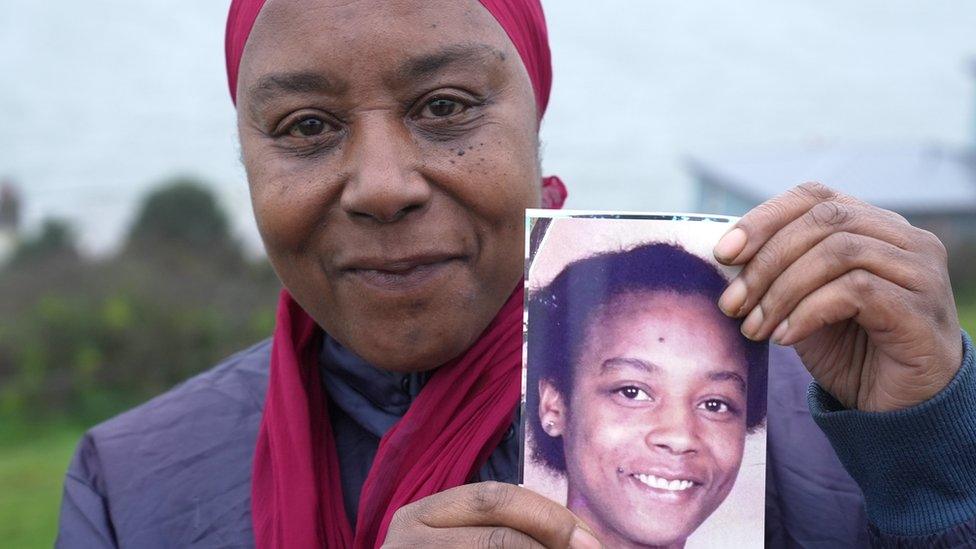
June and Jennifer decided to become writers in their teens so got a typewriter and started reading Jane Austen, DH Lawrence and Kingsley Amis books
How the 'Silent Sisters' story started
Their story - that included arson, Broadmoor and mixing with murderers - started in Yemen in 1963 when the Gibbons sisters were born to Barbadian parents, who settled in Wales because of their father's job in the Royal Air Force.
June, now 60, said both sisters were keen to integrate in their new rural community, where they were the only black family.
"I thought: 'I can be normal'," June recalls. "But it all faded away.
"I must have lost confidence, maybe it was a look, gesture or someone said something, I just clammed up. I went back to square one."
Educational psychologist Tim Thomas helped and he remembers the twins being bullied, which led to them becoming "electively mute".
They were separated in an attempt to make them integrate and communicate - and even the twins were up for a "new start".
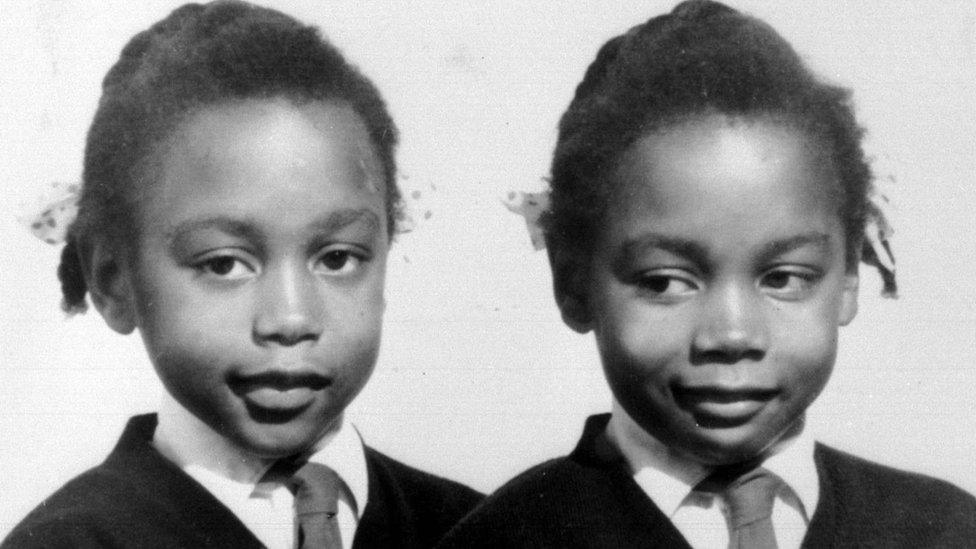
The sisters were born in Yemen before moving with their family to Yorkshire, Devon and finally west Wales
"We were desperate, we were trapped in our twinship and trapped in that language, we tried everything to separate ourselves," said June.
One sister was moved to boarding school, the other remained nearer home - but June said she stopped eating and speaking to people during that time so the experiment was quickly abandoned.
How did the sisters end up in Broadmoor?
After leaving school at 16, the twins felt more isolated than ever in "their own little prison" of their bedroom and that was when their story spiralled.
At 18, the aspiring writers felt their youth was "passing them by" so started spending time with boys they knew from school in west Wales and it ultimately led to Broadmoor.
"They introduced us to glue sniffing, smoking cigarettes and drinking vodka by the bottle," June recalled.
"The two of us were out of our minds. We were out of our depth, beyond help.
"So from going to being writers, we started destroying the town... vandalising places.
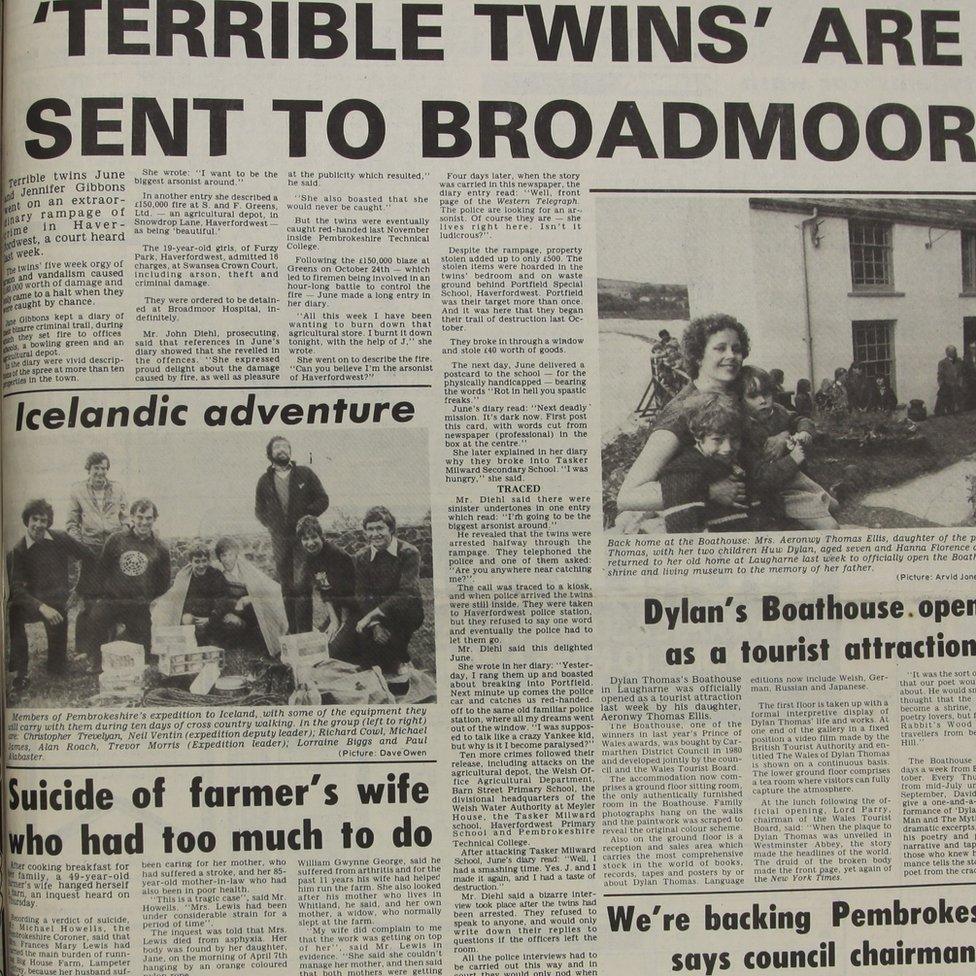
Western Telegraph story of June and Jennifer Gibbons being sent to Broadmoor
"We were sort of saying 'we'll ring the police and see if they can catch us'. We'll smash a window, we'll set fire to this and say 'come and catch us if you can'. We were trying things to try to get help."
Newspaper reports from the time described the girls going on "a five week crime spree", which included setting fire to a local tractor shop and breaking into a college and stealing supplies.
"They read both our diaries and in our diaries was the confession so they had us," admitted June.
"We were the ones doing all this crime, they had it there in black and white."
Parents Aubrey and Gloria, described as "delightful and very hospitable people", had no idea their twinnies - as they used to call them - had been setting fire to the buildings in Haverfordwest and getting into trouble with the police.
While in prison awaiting trial, the 19-year-olds were assessed by a psychiatrist who suggested they be moved to Broadmoor Hospital under the Mental Health Act.
"He said it was a hospital for people like us, who were psychopaths," June recalled.
"'There's nothing really wrong with me,' I was saying to myself, but then the psychiatrist said: 'There's work you can do, there's parties, discos.'
"I thought: 'Oh wow, its going to be great.'"

The story of the Gibbons twins: a tale of isolation, ambition, love, crime and tragedy.
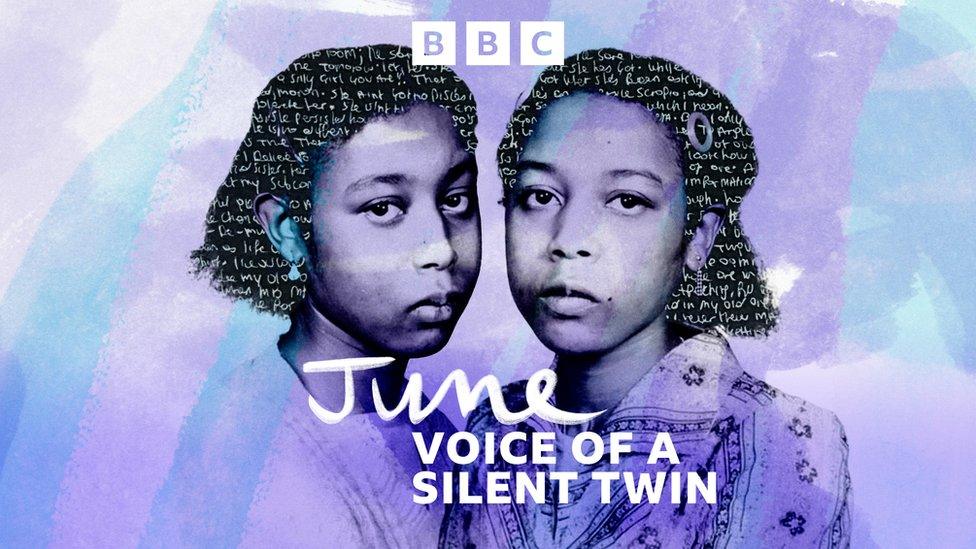
Listen to the new June: Voice of a Silent Twin podcast on BBC Sounds.

"We were excited to go to Broadmoor. We were too young to understand."
In court, the twins agreed to plead guilty on the advice of their solicitor, but journalist Marjorie Wallace, who reported on their case, recalls important information from their diaries being omitted.
"There were these counts of arson, but what the people judging them didn't know is that before they set fire they checked there was nobody in the building," she said.
Living with killers
June said they were expecting a sentence of about six months, but the judge committed them to the notorious Broadmoor institution for an indefinite period based on psychiatric reports. It was then that they began sharing their days with the UK's most dangerous criminals.
"My first boyfriend was there for armed robbery," said June. "Jennifer's boyfriend killed two women.
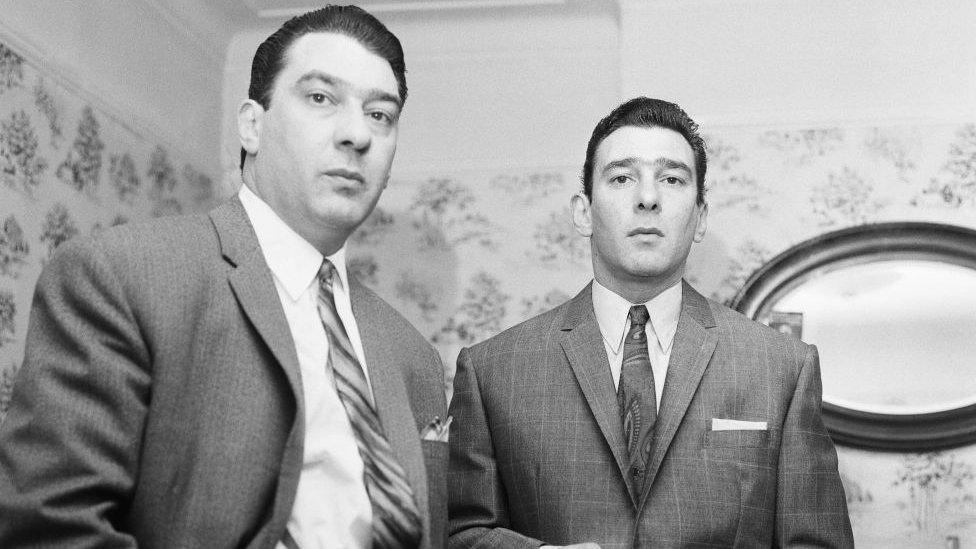
June Gibbons used to get Christmas and birthday cards from Ronnie Kray after they met in Broadmoor
"I saw the Yorkshire Ripper having a hamburger across the field and he looked like he's looking at me. I thought he could pounce so I didn't really look at him."
She recalls another incident: "Ronnie Kray came over to my table, he took my hand and kissed it and says 'hello June, I've been hearing about you'. We used to get Christmas and birthday cards from Ronnie."
Disgraced paedophile TV presenter Jimmy Savile was brought in to chair a taskforce to strengthen Broadmoor's therapeutic regime - and he was given his own set of keys.
June does not remember meeting Savile, later uncovered as one of the UK's most prolific sex offenders, but Marjorie Wallace did.
"He leapt onto our table, looked at the two girls, pointed and said to June 'I'll have you first' and then to Jennifer 'I'll have you second'," she recalled.
"June and Jennifer looked to me in astonishment and said 'they thought we were the mad ones'."

Both sisters kept a diary and here's part of Jennifer diary's of her time in Broadmoor
Both continued to write while locked up - both fiction and poetry.
Losing a sister
It also took years of writing to the Home Office before the twins would be moved to a lower security hospital after 11 years at Broadmoor, in 1993.
But there was a tragic twist for the sisters during their move nearer to their west Wales home.
June thought her sister was joking when she said: "I think I'm going to die soon."
"As we got in the minibus, Jennifer said: 'At last we're out of Broadmoor,'" June recalled.
"We'd planned to keep talking to people and we mustn't fight, argue or make a mess of it this time. We kept saying to each other 'be happy'."
But when they arrived at the Caswell clinic in Bridgend, psychiatrist Tegwyn Williams noticed Jennifer was under the weather and she soon took a turn for the worse.
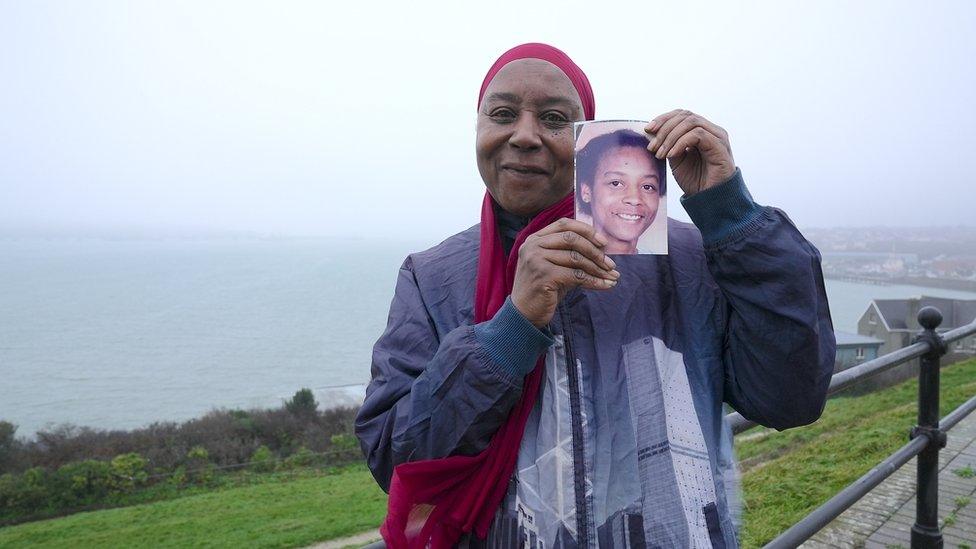
June Gibbons still lives in Pembrokeshire and has not married or had children
"We knew very early on that this wasn't a psychiatric condition but the physicians didn't know what the medical condition was either," recalled June.
"They couldn't make sense of it... this young woman who apparently several hours earlier had been as right as rain was dying slowly in front of their eyes and they couldn't work out why."
An inquest later found Jennifer died of natural causes due to acute myocarditis, an inflammation of the heart muscle.
Silent Sisters immortalised
In 1994, surviving twin June was released after nearly 13 years locked away - but she feels her experience in institutions affected her.
"Every other day I think of Broadmoor and when I think of Broadmoor, I think of Jennifer," she said.
"She's still with me after 30 years. Every other morning I think I'm in Broadmoor, I wake up in the morning, hear the jangling of the keys, it's still with me even to this day."
June has continued writing - while others have written about their story.
Allow YouTube content?
This article contains content provided by Google YouTube. We ask for your permission before anything is loaded, as they may be using cookies and other technologies. You may want to read Google’s cookie policy, external and privacy policy, external before accepting. To view this content choose ‘accept and continue’.
Welsh rock band Manic Street Preachers' 1999 top 20 hit Tsunami was inspired by the sisters and Marjorie Wallace wrote a book based on their experiences called The Silent Twins. A feature film was made in 2022 about their story.
June plans to publish more of her writing, including the poetry inspired by her sister during some of their most difficult times.
"Every day I wake up and say to myself, one more day for me and one more day for my sister," she said. "I live for her. What I see and do, she does as well."
If you have been affected by any of the issues in this story, the BBC Action Line has links to organisations which can offer support and advice
Related topics
- Published10 December 2022
